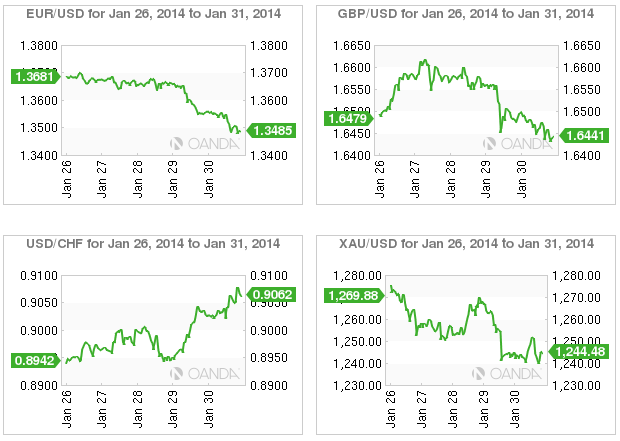Deflation remains the ECB's nemesis and the pressure has piled again on Euro policy makers after Friday's disappointing headline consumer price print. The annual rate of inflation for the 18-members that share the single currency, the EUR, fell to a new record low in January, with flash CPI, y/y falling to +0.7% from Decembers +0.8%. Analysts had expected an uptick to +0.9%.
With a print like this the market will expect the ECB to be more proactive. Draghi and company last cut rates in November when their annual rate of inflation fell to +0.7% from +1.1% m/m, and further away from their target just below the psychological +2% level.
Falling prices or low inflation will hinder the regions recovery from its long debt and banking crisis. Even worse, it could push the EUR members into a deflation atmosphere where prices actually fall as consumers delay their future consumption and investment needs. A lengthy period of falling prices will only further damage the Euro-zone tentative progress. Already Governments and households are struggling to finance their current debt load and when prices fall that effective "fixed" debt burden rises.
Some will argue that there are some tentative signs, like falling employment (Jan. +12% vs. +12.1% m/m) that consumer spending will rise over the coming months. But, will it be strong enough to support prices? That is the question facing the ECB. Can Draghi continue to voice with the same confidence that deflation won't be visiting the currency bloc? Consumer price reports like this will keep the debate alive. Expect a chorus of individuals to ask for more additional stimulus to help the struggling periphery. Next weeks ECB rate announcement will make for interesting reading.
Europe's backbone Germany is not making it any easier for Euro policymakers. German retail sales on Friday fell -2.5% in December, and easily wiped out the previous months gain of +0.9% in November. On a positive note, it does tend to be a volatile number. Friday's headline print is in stark contrast to other recent positive reports. January's German unemployment fell sharply, consumer confidence is on the rise and inflation remains relatively low – these are all positive that could lead to increase household spending and be a GDP plus.

